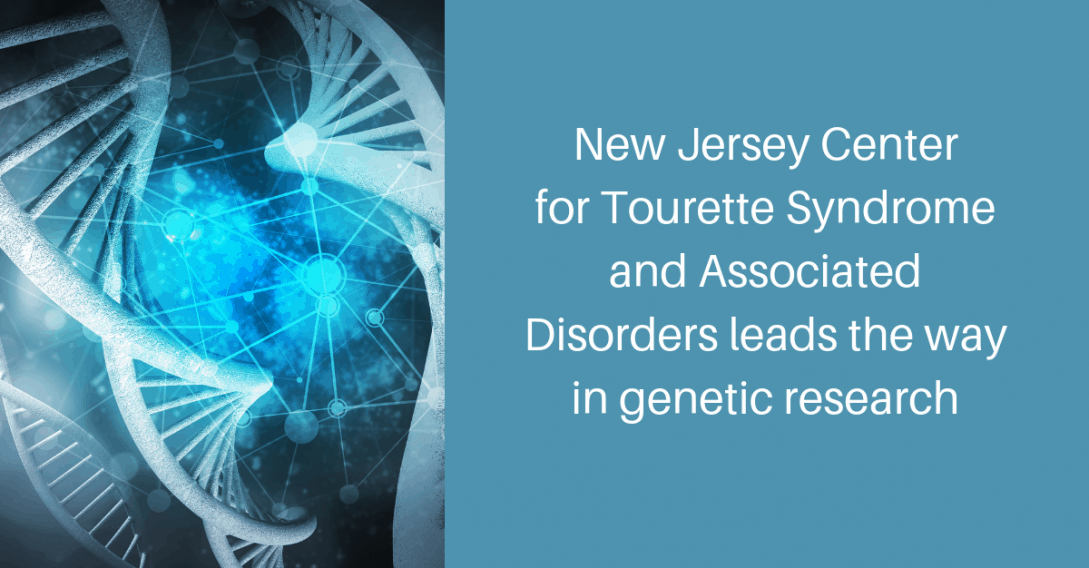Possible New Genetic Causes of Tourette syndrome
Editor: Efforts by the New Jersey Center for Tourette Syndrome and Associated Disorders (NJCTS) helped lead the way for new genetic findings. Director Faith Hill shared: It is with great pride that NJCTS announces a research breakthrough and a NIMH grant of $10 million for our research partners around the world to continue to lead the way in finding causes and treatments for Tourette Syndrome. In May of 2017, our team was the first to discover four genes that contribute to TS. Just published this week are the team’s most recent findings into what may cause Tourette Syndrome.
Caitlin Coyle, Rutgers University; Press release
An international team that includes multiple Rutgers scientists has made significant progress in understanding the genetic causes of Tourette syndrome. They estimate that over 400 singular or combined mutated genes could pose a risk for Tourette syndrome, suggesting the disorder is as complex as autism, epilepsy, and intellectual disability.
The study appears in the journal Cell Reports
Jay Tischfield, MacMillan Distinguished Professor of Genetics, and Gary Heiman, associate professor in the Department of Genetics, are part of the ongoing Tourette International Collaborative Genetics (TIC Genetics) study, which is the largest DNA sequencing study of Tourette. The new results are the second major set to come out of the 11-year-old study, following last year’s findings that four damaged, high-risk genes may disrupt the normal brain development.
In the new study, scientists and clinicians from Rutgers, University of California-San Francisco, and from around the United States, Europe and South Korea report two significant findings: Tourette syndrome is sometimes caused by new and rare damaging mutations in specific genes or through structural mutations, known as copy number variants (CNVs), spanning multiple genes. In addition to likely Tourette risk genes, they found another “high confidence” risk gene called CELSR3.
According to Tischfield, CNVs change the structure of segments of DNA, either through duplication or deletion. “We discovered that CNVs occur two to three times more often in children with Tourette syndrome compared to those without,” he said.
Additionally, the reoccurring damaging mutations in CELSR3 in different families, as well as observation of new mutations in other genes involved in cell polarity, provide additional evidence for how brain development is disrupted in Tourette syndrome. “These two significant findings provide a framework for future research into the causes and treatment of this remarkable and peculiar disorder,” said Tischfield.
Recently, the National Institute of Mental Health (NIMH) awarded the TIC Genetics study a grant of more than $10 million to continue the research for the next five years.
According to Heiman, the ongoing funding and research would not have been possible without the support of the New Jersey Center for Tourette Syndrome and Associated Disorders (NJCTS).
“NJCTS executive director Faith Rice and the more than 200 families at NJCTS were instrumental in launching the pilot study,” said Heiman. “Through the initial families who participated, we were able to collect samples and data to start the study and establish the first sharing repository for researchers from all over the world interested in studying Tourette syndrome.”
In 2011, the NJCTS sharing repository at Rutgers was incorporated as part of the study, which allows researchers around the world to work together to investigate the possible causes of Tourette and attempt to ultimately enable the development of more effective treatments.
“It has been rewarding to see researchers come together as a strong team committed not only to research but to finding answers,” Rice said.
According to NJCTS, Tourette syndrome is a neuropsychiatric disorder characterized by involuntary movements and uncontrollable vocal sounds referred to as tics. Tourette usually presents in early childhood, affects all races and ethnic groups, and is often accompanied by co-occurring conditions, such as depression, obsessive-compulsive disorder or attention deficit disorder. Currently, there is no known cause for Tourette syndrome nor is there a medication available that completely eliminates symptoms.
Explore further: Scientists first to use genetic engineering technique to investigate Tourette’s
More information: Sheng Wang et al. De Novo Sequence and Copy Number Variants Are Strongly Associated with Tourette Disorder and Implicate Cell Polarity in Pathogenesis, Cell Reports (2018). DOI: 10.1016/j.celrep.2018.08.082
October 3, 2018









